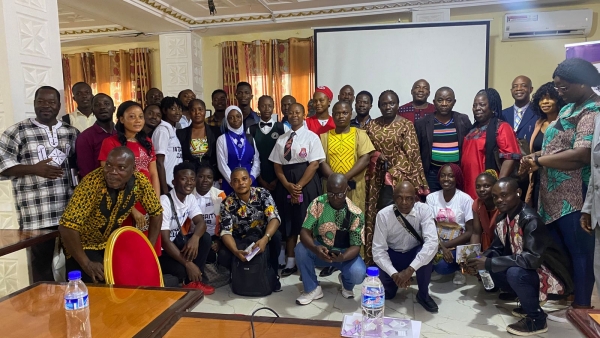Monrovia, October 14, 2022 - A one-day Stakeholders’ Dialogue intended to present findings from a recently conducted Political Economy Analysis in Education (PEA) has been convened in Monrovia by the Center for Transparency and Accountability in Liberia (CENTAL) in partnership with the Development Alternatives Incorporated (DAI).
The PEA is an activity implemented under the Civil Society Activity (CSA) funded by USAID and implemented by its partners including, CENTAL, DAI, and NAYMOTE Partners for Democratic Development and Accountability Lab (ILAB). The Political Economy Analysis (PEA) is a structured approach designed to examine power dynamics, political, and economic forces that influence governance and development as well as service delivery. The study was undertaken in three counties including Bong, Bassa, and Nimba.
Speaking at the opening of the Dialogue in Monrovia, CENTAL’s Executive Director Anderson D. Miamen acknowledged the presence of participants including counties officials from Bong, Grand Bassa, and Montserrado counties. He asserted that, with the diverse stakeholders represented at the event, especially, the Government of Liberia, relevant issues pertaining to education will be discussed. While giving a brief synopsis of the CSA projects, he said that the CSA projects funded by USAID seek to support CSOs to play their roles more effectively and to engage the governance process, especially education and health meaningfully. The one-day gathering, according to the CENTAL Executive Director is intended to afford the partners the opportunity of learning more about the PEA and its findings.
Presenting the overview, the Development Alternatives Incorporated (DAI) Deputy Chief of Party Francis Kempeh said the PEA is an adaptable activity that could be tweaked or changed based on prevailing circumstance (s). It focuses on deriving what he called, ‘local solutions to local problems.
The PEA process, among other things, involved interpersonal interviews and focus group discussions on gauging educational stakeholders’ perspectives on incentives and disincentives to greater county and district-level oversight of education services, reflective of recent efforts to decentralize the sector.
For her part, the Team Lead of USAID’s CSOs, Media and Conflict/ Democracy, Human Rights and Governance Section called on stakeholders to ensure that the research report turns into meaningful actions.
There were panel discussions, with the three (3) panelists weighing in on the PEA findings and recommendations. The Chairperson of the National Civil Society Council of Liberia, Loretta Alethea Pope Kai deliberated on the topic: ‘The 2018 Local Government Act – A Pathway to Decentralization’, while both the Superintendent of the Monrovia Consolidated School System (MCSS) and the President of the National Parents Teachers Association of Liberia (NPTAL), separately deliberated on the topics: ‘Comparative Analysis of Education Policy and Schools Administration and Governance, and The Role of PTA in Schools Supervision and Management, respectively.
Results from the PEA were presented to over sixty (60) educational stakeholders including officials from County and District Education Officers, representatives of Civil Society Organizations, principals, students, teachers, and policymakers with the purpose of improving the overall quality of the educational system and ensure that requisite education bodies and authorities have the required tools, resources, and infrastructure to improve the sector.

